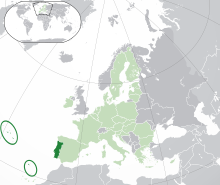LGBTQ rights in Portugal | |
|---|---|
 Location of Portugal (dark green) – in Europe (light green & dark grey) | |
| Status | Legal since 1982; age of consent equalized in 2007 |
| Military | Gays, lesbians and bisexuals allowed to serve openly |
| Discrimination protections | Sexual orientation and gender identity protections (see below) |
| Family rights | |
| Recognition of relationships | De facto union since 2001, Same-sex marriage since 2010 |
| Adoption | Full adoption rights since 2016 |
Lesbian, gay, bisexual, transgender, and queer (LGBTQ) rights in Portugal are among the most advanced in the world; having improved substantially in the 21st century.[1][2] After a long period of oppression during the Estado Novo, Portuguese society has become increasingly accepting of homosexuality,[3] which was decriminalized in 1982,[4] eight years after the Carnation Revolution. Portugal has wide-ranging anti-discrimination laws and is one of the few countries in the world to contain a ban on discrimination based on sexual orientation in its Constitution. On 5 June 2010, the state became the eighth in the world to recognize same-sex marriage.[5][6][7] On 1 March 2011, a gender identity law, said to be one of the most advanced in the world, was passed to simplify the process of sex and name change for transgender people.[8] Same-sex couples have been permitted to adopt since 1 March 2016.[9]
The country, while still influenced by Roman Catholicism, has progressively become more accepting of same-sex relationships and homosexuality. The 2019 Eurobarometer opinion survey showed that 74% of the Portuguese population supported same-sex marriage and that around 80% believed lesbian, gay and bisexual people should enjoy the same rights as heterosexuals. Lisbon, Porto and Faro have visible LGBT scenes, with several gay bars, nightclubs and other venues, as well as their annual pride parades.
- ^ "Portugal". IGLTA. Retrieved 9 February 2024.
- ^ Cite error: The named reference
Newsweekwas invoked but never defined (see the help page). - ^ Mark Ellingham, John Fisher, Graham Kenyon: The rough guide to Portugal, Rough Guides, 2002, ISBN 9781858288772, p. 49.
- ^ "PortugalPride.org: sabia que..." portugalpride.org. Archived from the original on 17 May 2019. Retrieved 22 December 2006.
- ^ "Lei n.° 9/2010 de 31 de Maio Permite o casamento civil entre pessoas do mesmo sexo" (PDF). Archived (PDF) from the original on 6 January 2014. Retrieved 1 October 2010.
- ^ "Segunda-feira já vai ser possível celebrar casamentos entre pessoas do mesmo sexo". Archived from the original on 29 February 2012.
- ^ Portugal's president to ratify same-sex marriage law Archived 5 November 2013 at the Wayback Machine, BBC News, 17 May 2010
- ^ "Cavaco promulga diploma que simplifica mudança de sexo – JN". www.jn.pt. Archived from the original on 5 January 2022. Retrieved 19 May 2020.
- ^ "Lei n.º 2/2016 de 29 de fevereiro" (PDF). Archived (PDF) from the original on 27 September 2018. Retrieved 1 March 2016.